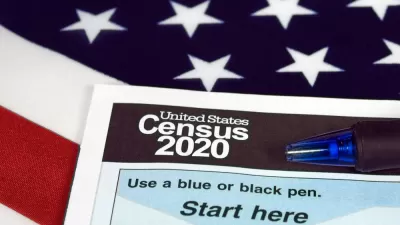An article for Planning magazine readies the planning profession for the largest peacetime activity of the federal government. All indications are that the 2020 Census will include unprecedented changes.

"That's right. It's almost census time, an American tradition since 1790," writes Christopher Williamson.
Williamson's post is a call to action for planners to understand the significance of the Census for their work, as well as possibly to participate in the Census process once it's running in full force in 2020.
First Williamson, notes the many changes that are still under consideration for the 2020 Census:
Several things are new this time around. For one, the census that will take place in three years is going almost all-digital. It also may have a few changes in the race/ethnic origin categories that could affect comparability with past census data and other datasets. And perhaps of the most immediate use to planners and local governments: There are tons of new tools for harnessing and crunching data.
As for the relevance of the Census to the planning profession, Williamson states the case:
Planners use census data all the time, particularly from the ACS. It delivers age and characteristics of housing structures, housing costs, employment and journey to work, educational attainment and school enrollment, persons with disabilities, and other statistics. ACS data also provides median household incomes and poverty statistics that qualify census tracts for Community Development Block Grants. Each ACS question is related to a federal program or directly required by legislation, but it also functions as a continuous narrative of how and where we live in the 50 states and the District of Columbia.
Williamson concludes by listing the software tools and data tips that can help harness the full power of the Census, along with a timeline of significant events that will take place before 2020 in laying the foundation for a thorough, successful census.
[Editor's note: you might need to login to the APA website to view the article in full.]
FULL STORY: Countdown to the National Selfie

Alabama: Trump Terminates Settlements for Black Communities Harmed By Raw Sewage
Trump deemed the landmark civil rights agreement “illegal DEI and environmental justice policy.”

Study: Maui’s Plan to Convert Vacation Rentals to Long-Term Housing Could Cause Nearly $1 Billion Economic Loss
The plan would reduce visitor accommodation by 25% resulting in 1,900 jobs lost.

Planetizen Federal Action Tracker
A weekly monitor of how Trump’s orders and actions are impacting planners and planning in America.

Federal Homelessness Agency Places Entire Staff on Leave
The U.S. Interagency Council on Homelessness is the only federal agency dedicated to preventing and ending homelessness.

Restoring Northern India’s Himalayan ‘Water Temples’
Thousands of centuries-old buildings protect the region’s natural springs and serve as community wells and gathering places.

Milwaukee to Double Bike Share Stations
Bublr Bikes, one of the nation’s most successful, will add 500 new e-bikes to its system.
Urban Design for Planners 1: Software Tools
This six-course series explores essential urban design concepts using open source software and equips planners with the tools they need to participate fully in the urban design process.
Planning for Universal Design
Learn the tools for implementing Universal Design in planning regulations.
Caltrans
Smith Gee Studio
Institute for Housing and Urban Development Studies (IHS)
City of Grandview
Harvard GSD Executive Education
Toledo-Lucas County Plan Commissions
Salt Lake City
NYU Wagner Graduate School of Public Service





























